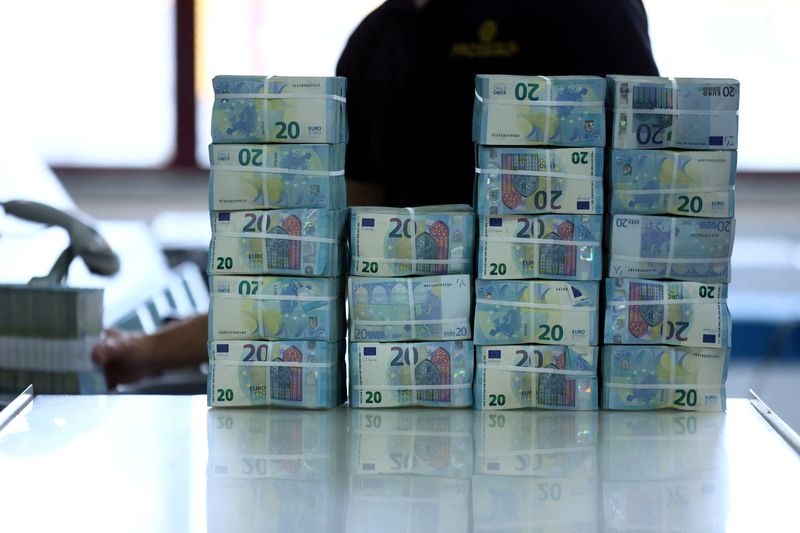By Alun John
LONDON (Reuters) -The euro dropped back below parity against the dollar as European government bond yields slid after the European Central Bank raised rates by an expected 75 basis points, but hinted at a slower pace of future increases.
The central bank’s second successive 75 basis point increase comes as inflation is high and broadening, but spot energy prices are falling, a looming recession will dampen price pressures, and there are no significant signs of a wage-price spiral.
This could give the ECB the chance to slow its rate increases, or maybe even pause them early in 2023, though ECB chief Christine Lagarde would not be drawn.
She reiterated at the post-meeting press conference that the ECB had made significant progress in withdrawing monetary accommodation but had more ground to cover.
“We have acknowledged more rate (hikes) are in the pipeline but at which pace and to which level I cannot tell you,” she said.
Bank stocks were also in focus, rising after the central bank changed the terms of one of its pandemic-era programme of loans to lenders.
“The ECB is living on the edge of a dovish pivot,” said Viraj Patel, global macro strategist at Vanda Research.
“It’s clear that this is a central bank that wants to front-load rate hikes to control inflation. But they are also wary that they are not in control of a lot of external growth and market factors that can act as a circuit-breaker to the hiking cycle.”
The euro fell over 1% against the dollar to $0.9972 compared to $1.0032 before the ECB decision. It also lost ground against sterling and the Japanese yen
Adding to pressure on the euro was a rally in the government debt market, which sent yields lower, after the ECB signaled that it had not discussed how or when it would unwind its huge holding of euro zone bonds.
The yield on both German and Italian government bonds dropped, reflecting the rise in their prices. The benchmark German 10-year Bund <DE10YT=RR> was down 12 basis points on the day at 2% compared with 2.195% before the ECB announcement.
The ECB’s statement at its last meeting in September said “over the next several meetings the Governing Council expects to raise interest rates further to dampen demand,” while Thursday’s merely said it expected “to raise interest rates further”.
“This is probably an indication of a slower rate increase in December,” said Chris Scicluna, head of Research, Daiwa Capital Markets.
Euro money markets showed traders expect euro zone rates to peak around 2.55% by next November from almost 3% before the ECB’s policy decision.
European bank stocks were up 0.84% having earlier traded lower, following the changes to the terms of the ECB’s Targeted Longer-term Refinancing Operations (TLTRO) to remove a subsidy on its multi-year loans to banks to encourage them to repay them early.
The changes were not as dramatic as some in the market had expected.
“Interestingly, bank stocks have risen, despite the tightening of rules on TLTROs. Our view is that this is because the lack of discussion of quantitative tightening (QT) is seen as dovish, given the context,” said Altaf Kassam, head of investment strategy, State Street.
The pan-European STOXX 600 index pared some losses to fall 0.4%, having traded as much as 0.94% lower earlier on.
(Additional reporting by London markets team; writing by Alun John; editing by Amanda Cooper and John Stonestreet)
